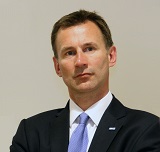 On 11 December leaders of health services and scientists from the world’s leading economies met in London to discuss a co-ordinated approach to combat dementia – the first G8 summit on a specific illness since HIV. The summit was called by the UK as part of its G8 presidency and saw agreement on a package of measures to tackle the growing global health, social and economic crisis of dementia. Currently 36 million people across the world have the condition and the World Health Organisation predicts that numbers will nearly double every two decades.
On 11 December leaders of health services and scientists from the world’s leading economies met in London to discuss a co-ordinated approach to combat dementia – the first G8 summit on a specific illness since HIV. The summit was called by the UK as part of its G8 presidency and saw agreement on a package of measures to tackle the growing global health, social and economic crisis of dementia. Currently 36 million people across the world have the condition and the World Health Organisation predicts that numbers will nearly double every two decades.
Speaking at the Summit, Prime Minister David Cameron said: “It doesn’t matter whether you’re in London or Los Angeles, in rural India or urban Japan – dementia steals lives; it wrecks families, it breaks hearts and that is why all of us here are so utterly determined to beat it.
“In generations past, the world came together to take on the great killers. We stood against malaria, cancer, HIV and AIDS and we are just as resolute today. I want 11 December 2013 to go down as the day that the global fight-back began.”
RAAs a result of the summit on dementia, the participant countries agreed to:
• Set an ambition to identify a cure or a disease-modifying therapy for dementia by 2025 – backed by a commitment to together significantly increase the amount spent on dementia research and increase the number of people involved in clinical trials and studies on dementia
•Establish a new Global Envoy for Dementia Innovation, following in the footsteps of global envoys on HIV and AIDS and on climate change. The Global Envoy will bring together international expertise to stimulate innovation and co-ordinate international efforts to attract new sources of finance, including exploring the possibility of a new private and philanthropic fund to support global dementia innovation
• Develop an international action plan for research – in particular to identify current gaps and how to fill them
• Share information and data from dementia research studies across the G8 countries to work together and get the best return on investment in research
• Encourage open access to all publicly-funded dementia research to make data and results available for further research as quickly as possible.
In a précis of the communique issued after the summit, the Department of Health said that greater investment in research, focusing research where there is more to learn and greater sharing of data will mean everyone understands more and can move towards better treatment and cures – in the same way that medicine has made great strides in tackling diseases like HIV and cancer.
However, simply increasing spending on dementia research will not be enough, which is why there will be an action plan on how the G8 countries will work together to fill the gaps and opportunities in dementia research with the ultimate aim of finding a cure or disease-modifying treatment by 2025.
In his closing address, Health Secretary Jeremy Hunt (pictured) pointed to the cost of dementia globally: an ‘astounding’ $604bn or about one per cent of the world’s GDP.
However, he said, it isn’t just an economic problem – the impact the disease has on those diagnosed with dementia and on their families, their carers and their friends cannot be measured.
Dr Margaret Chan, the director-general of the World Health Organisation, said:
“WHO warmly welcomes the aims and outcomes of this summit, with its ground-breaking proposals to stimulate research and development to catch up with a runaway human tragedy. WHO’s priority will be to help countries, especially in the developing world, cope with their rapidly ageing populations and escalating numbers of people with dementia.”
The participant countries will come together throughout 2014 to build on the commitments agreed at the summit. In March the UK will hold an event on how to get greater investment and finance in innovative care. This will be followed by an event in Japan on what new care and prevention models could look like and an event hosted by Canada and France on industry partnerships between academe and industry. The G8 countries will then meet in the US in February 2015 with other global experts, including WHO and OECD, to review the progress that has been made on this research agenda.